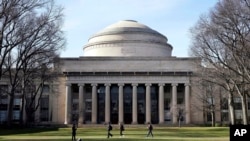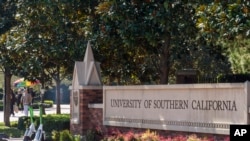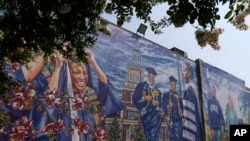Student Union
Foreign Students Are Targets of Hate Speech
Joon Baek, a Korean student at Columbia University in New York City, was riding the subway last year when a woman sitting across from him began to shout. In America’s largest city of nearly 8 million people, it is not unusual to hear someone ranting.
“I was commuting from campus back to Korea Town where I live, and I tried not to say anything, to just look down, was just minding my own business,” Baek described. “But it got worse and worse, and it wasn’t just any kind of verbal assault. I realized it was actually directed at me.”
Baek said he was uncomfortable, given that anti-Asian hate crimes that have spiked during the COVID-19 pandemic, according to police data.
He decided to get off at the next stop.
Most of the international students in the U.S. are students of color, according to statistics from the Institute for International Education.
Jessica, a Chinese national from South Africa graduating from the Parsons School of Design in New York, said news reports of anti-Asian incidents make her more cautious.
“I used to feel really safe in New York, but that hasn’t been the case since 2020. … For the first time, I feel targeted when I’m walking down the street,” she said. “It’s really sad because I have to avoid going out in the dark. I have to avoid certain streets which are dark. I have to always be very cautious and very aware of my Asian identity.”
All the students VOA talked with said they generally feel comfortable on campus and among America’s diverse urban populations. They say the experience of living in a multicultural society has opened their eyes.
Baek, who studies cyber privacy and data security, said he came to the U.S. in 2015 from South Korea for the excellence in education.
“America offers the best universities, the most renowned ones, and I felt like going to America, studying there, would open up new opportunities that I wouldn’t have if I had studied back in Korea.”
Andy Mao, a biology graduate from New York University, was taking photos with three non-Asian classmates in front of the school, laughing and enjoying their graduation celebration.
“It’s been an amazing journey, especially when I look back and I got to see so many different cultures coming together. And most importantly, meet friends from different countries, cultures and get to know their stories,” Mao said. “It’s really expanded my mind, and I appreciate this kind of freedom for me to explore the world.”
But despite his enthusiasm, Mao said news reports about anti-Asian hate give him pause.
“I definitely felt really sad to see those attacks happening not only in New York City but other cities, as well. Sometimes I feel a little bit unsafe when I’m in this kind of situation,” Mao said. “But I’m lucky. I’ve received a lot of love and support.”
While overall reported hate crimes decreased 7 percent last year — likely because of lockdowns — reports of hate crimes against Asians rose nearly 150% in 16 of the largest U.S. cities, according to police data cited by the Center for the Study of Hate and Extremism at California State University-San Bernardino (CSUSB).
But isolated incidents leave a mark.
Archit Choudhury, who is graduating from Columbia University in computer science, said he was walking in the midwestern city of St. Louis, Missouri, enjoying the Gateway Arch and hanging out with other students, when an elderly woman accosted him.
“‘You guys suck. Go back to your country. Why are you in the U.S.?’ That’s pretty much it. It’s been a rare, one-off occasion. It’s nothing that would make me feel unsafe,” Choudhury said. “It still sucks when it does happen.”
See all News Updates of the Day
Malaysian official: Schools can’t turn away from global tensions

Zambry Abdul Kadir, Malaysia’s higher education minister, said protests spreading across universities in the United States show that schools can’t ignore political tensions.
Helen Packer, reporting in Times Higher Education, said the minister reminded educators that universities are key in the development of leaders, individuals and societies. (April 2024)
Social media breaks are difficult, but necessary

Between online classes, maintaining social connections and working on projects, college students can have a hard time disengaging from the demands of technology.
In Florida International University’s PantherNOW, Ariana Rodriguez offers strategies for taking a break from social media. (April 2024)
- By Melos Ambaye
Many master's degrees aren't worth the investment, research shows
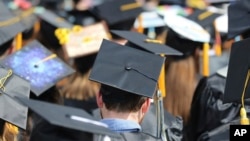
Nearly half of master's degrees have a negative financial return, according to new research by the Foundation for Research on Equal Opportunity, an economic research organization.
The study indicates that many graduate degree programs do not increase lifetime earnings enough to be worth it.
While 23% of bachelor’s degree programs yield a negative financial return on investment, 43% of two-year degrees and master’s degrees fail to deliver a return, according to the study by Preston Cooper, a senior fellow at FREOPP.
Cooper assessed the return on investment for 53,000 degree and certificate programs to determine whether a student’s lifetime earnings outweigh program costs and the risk of not completing their degree.
His findings show that a student’s field of study was the overriding indicator of return on investment at the undergraduate and graduate level.
Engineering, computer science and nursing bachelor’s degrees have high financial returns on investment, while programs in education, fine arts, psychology and English usually have low returns.
Graduate degrees in medicine and law tend to have strong payoffs. But a large share of master’s programs, including the MBA, frequently have low payoffs, according to Cooper.
Although workers with master’s degrees earn 16% more than those with only bachelor’s degrees, Cooper says the figure fails to account for students who had “higher preexisting earnings potential.”
“MBA students typically have high preexisting earnings potential, having often chosen high-ROI undergraduate majors such as finance and economics,” Cooper writes. “So the MBA adds little value on top of that.”
The study indicates that high starting salaries are predictors of high returns on investment. Degrees with starting salaries of $57,000 a year or more deliver the best lifetime returns.
But the return on investment of a degree can vary depending on the educational institution.
“Students interested in fields with low average pay can still find some schools that do well transforming those fields of study into high-paying careers,” Cooper writes.
The quality of an institution also matters, said William Tierney, professor emeritus of higher education at the University of Southern California.
“An MBA from Harvard is a likely ticket to a good job,” Tierney told VOA. “An MBA from the University of Phoenix, less so.”
But students pursue graduate programs for more than just financial reasons.
“Some degrees open up careers in fields that students may enjoy, such as in the performing arts,” Robert Kelchen, head of educational leadership at the University of Tennessee, Knoxville, told VOA.
“Others can help gain access to social networks or simply help students learn about a topic that is of interest,” Kelchen added.
Cooper told VOA that it might make sense for students in degree programs with low returns on investment to switch majors if they can still graduate on time.
He found the worst outcome for a student’s return on investment is dropping out of college “because they must pay for one or more years’ tuition and spend time out of the labor force.”
Lawmakers who fund higher education have a responsibility in ensuring “higher education delivers on its promise of economic mobility,” Cooper said.
Nearly a third of federal funding, including Pell grants and student loans, pays for higher education programs that fail to provide students with a return on investment, according to the study.
Cooper’s view is that “some schools should shut down low-ROI programs and reallocate institutional resources to programs with a better return.”
“There's definitely this narrative out there that higher education is always worth it, and you should always try to get that extra degree because it will increase your earnings,” he told VOA. “That's reinforced by colleges who make lofty promises regarding their graduate degree programs' outcomes, which all too often fall short.”
Harvard students end protest as school agrees to discuss Gaza conflict
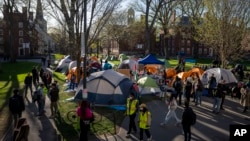
Protesters against the war between Israel and Hamas were voluntarily taking down their tents in Harvard Yard on Tuesday after university officials agreed to discuss their questions about the endowment, bringing a peaceful end to the kinds of demonstrations that were broken up by police on other campuses.
The student protest group Harvard Out of Occupied Palestine said in a statement that the encampment "outlasted its utility with respect to our demands." Meanwhile, Harvard University interim President Alan Garber agreed to pursue a meeting between protesters and university officials regarding the students' questions.
Students at many college campuses this spring set up similar encampments, calling for their schools to cut ties with Israel and businesses that support it.
The Israel-Hamas war began when Hamas and other militants stormed into southern Israel on October 7, killing some 1,200 people and taking 250 hostages. Palestinian militants still hold about 100 captives, and Israel's military has killed more than 35,000 people in Gaza, according to Gaza's Health Ministry, which doesn't distinguish between civilians and combatants.
Harvard said its president and the dean of the Faculty of Arts and Sciences, Hopi Hoekstra, will meet with the protesters to discuss the conflict in the Middle East.
The protesters said they worked out an agreement to meet with university officials, including the Harvard Management Company, which oversees the world's largest academic endowment, valued at about $50 billion.
The protesters' statement said the students will set an agenda that includes discussions on disclosure, divestment, reinvestment and the creation of a Center for Palestine Studies. The students also said that Harvard has offered to retract suspensions of more than 20 students and student workers and back down on disciplinary measures faced by 60 more.
"Since its establishment three weeks ago, the encampment has both broadened and deepened Palestine solidarity organizing on campus," a spokesperson for the protesters said. "It has moved the needle on disclosure and divestment at Harvard."
Chinese students report interrogations, deportations at US airports
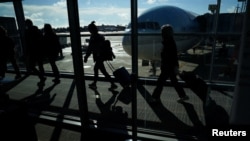
Academics from China are reporting increased scrutiny at U.S. airports, with valid visa holders being interrogated and turned away by Customs and Border Protection Agents.
Phones and laptops have been searched, and researchers have undergone extensive questioning about their work. One graduate student at Yale, who was midway through her PhD, was turned back at Dulles airport and banned from entering the U.S. for five years, according to The Guardian.







